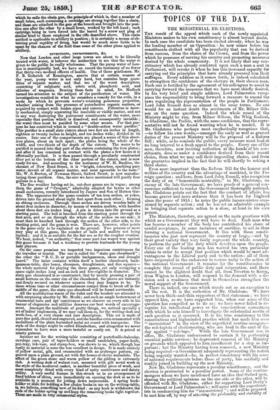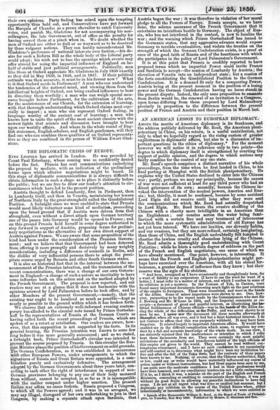TOPICS OF THE DAY.
THE MINISTERIAL RE-ELECTIONS.
THE result of the appeal which each of the newly appointed Ministers makes to his own constituency is almost beyond doubt. In each case the candidate has been elected already, when he was the leading member of an Opposition : he now comes before his constituents clothed with all the popularity that can be derived from success, from the choice of the Crown, and from the power which he possesses of serving his country and promoting measures desired by the whole community. It is not likely that any con- stituency which has already conferred upon such a man a seat in Parliament, will revoke it when he has this increased capacity for carrying out the principles that have already: procured Ilium their suffrages. Every address as it comes forth, is indeed calculated to strengthen the confidence of the electors in their chosen man. Each one is fortified by the agreement of his colleagues to assist in carrying forward the measures that we have most chiefly desired. In his very brief and simple address, Lord Palmerston recog- nises the responsibility to bring forward a measure to amend the laws regulating the representation of the people in Parliament. Lord John Russell does so almost in the same terms. No one would for an instant doubt the sentiments of Mr. Milner Gib- son on the same question. Indeed the whole round of the Ministry might be run, from Milner Gibson, the Whig Radical,. to Gladstone, the Peelite, with the same confidence, that the repre- sentative will not be found wanting when he is needed. It is Mr. Gladstone who perhaps most emphatically recognises that, —to follow his own words,—amongst the early as well as gravest duties of the present Ministry will be the proposal of a Reform Bill ; while, as he reminds the public, every measure must lead at no long interval to a fresh appeal to the people. Every one of the men, therefore, now inviting reelection at the hands of his con- stituents, does so under a confidence derived from their recent choice, from what we may call their impending choice, and from the guarantee implied in the fact that he will shortly be asking a third choice.
Even more important than the Reform Bill for the honour and welfare of the country and, the advantage of mankind, is the Fe-. reign question ; and here, from Lord John Russell, who recognises the duty of an "honourable neutrality," to Mr. Gladstone, no enemy of the late Government, we have proofs of a general con- currence sufficient to render the Government thoroughly national. Mr. Gladstone points out the fact that the conduct of affairs has become graver and more arduous than it has been for England since the peace of 1815 ; he notes the public inconvenience occa- sioned by separate notion; and he has set an admirable example in bringing that separate action to a close, at least in his own person.
The Ministers, therefore are agreed on the main questions with which as a Government they will have to deal. Each man who has become a member of the body has contributed his share of candid acceptance, in some instances of sacrifice, to aid in thus forming a national Government. It lies with those consti- tuencies who just now represent the country at large,—and by their great variety they very fairly represent the whole country, to perform the part of the duty which devolves upon the people. Every one of the leading men has waived his own particular claims in order to accept that position which would be most ad- vantageous to the Liberal party and to the nation ; all of them have cooperated in the endeavour to restore unity to the action of the national Government: it remains for the constituencies to complete this round of public duty and cooperation and there cannot be the slightest doubt that all, from Tiverton to Kerry., from Wigton to London, will respond to the demand with a de- cision and a readiness that must in themselves strengthen the moral support of the Government. There is, indeed, one case which stands out as an exception to all the rest. It is the reelection of Mr. Gladstone. We have never been thick-and-thin supporters of that statesman ; we have opposed him, as we have supported him, whea our sense of the question has compelled us to do so ; we have never failed to re- cognize his intellectual power or the conscientious earnestness with which he sets himself to investigate the substantial merits of each question as it occurred. It is his true consistency to this conscientious and highminded practice which has made him seem, "inconsistent" in the view of the superficial routine-mongers- the red-tapists of electioneering, who are loud in the cant of the day against "red-tape." While the late Government was in office, Mr. Gladstone endeavoured to sustain it by performing essential public services ; he deprecated removal of the Ministry on grounds which appeared to him insufficient for a step so im- portant ; but the Ministry having been removed, a new Ministry being required—a Government adequately representing the nation being urgently wanted—he, in perfect consistency with his sense of national requirements before those of party, has cordially and readily joined in building up the new Ministry.
No'w Mr. .Gladstone represents a peculiar constituency, and the election is protracted to a peculiar period. Some of the routine- mongers whom we have mentioned have an idea that Oxford men,
sharing the political opinions on the one side or the other, will be offended with Mr. Gladstone either for supporting Lord Derby's
Government or Lord Palmertiton's ; will agree with the superficial: ists in condemning him for " 'inconsistency " ; and will be prep red_ to oast him off, by way of attesting the profundity and stability of
their own opinions. Party feeling has seized upon the tempting opportunity thus held out, and Conservatives have put forward the Marquis of Chandos as a preux chevalier to catch University votes, and punish Mr. Gladstone for not accompanying his non- colleagues, the late Government, out of office as the penalty for having served them at a pinch when in. We doubt whether the men of Oxford are either so dull or so wayward as to be deceived by these vulgarer notions. They can hardly misunderstand Mr. Gladstone's preference of national interests over faction,—his de- sire for such a Reform Bill as the whole body of the Liberal party could adopt ; his wish not to lose the openings which events may offer abroad for using the impartial influence of England on be- half of stable and just political arrangements. Politically, men like those at Oxford appreciate Mr. Gladstone in July 1859 exactly as they did in May 1859, in 1858, and in 1837. If their political estimate was then accurate, it must be in his favour now ? What is it that Oxford needs in Parliament ? A man who can understand the tendencies of the national mind, and viewing them from the intellectual heights of Oxford, can bring exalted influences to bear in directing them worthily ; a man who can weigh special mea- sures brought before Parliament, for the cultivation of the arts, for the maintenance of our Church, for the extension of learning, with that thorough understanding which Oxford claims most espe- cially to impart ; a man who can represent Oxford feeling, in language worthy of the ancient seat of learning ; a man who knows how to unite the spirit of the most ancient classics with the newest lights that science and discussion have brought to bear upon our worldly affairs. And where in the whole round of Eng- lish statesmen, English scholars, and English gentlemen, will they find one who can combine these qualities of an Oxford representa- tive as they are combined in the person of William Ewart Glad- stone.

























 Previous page
Previous page